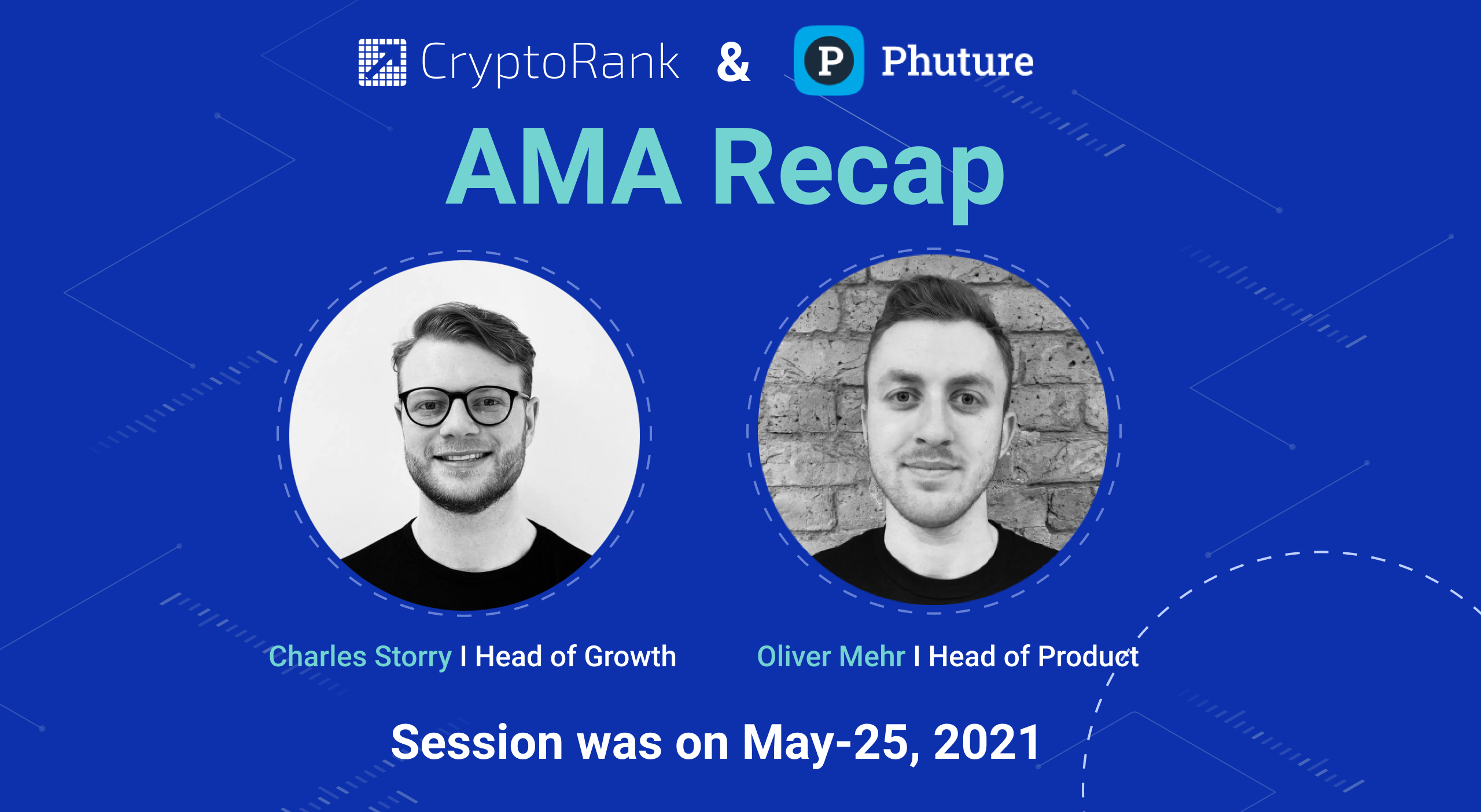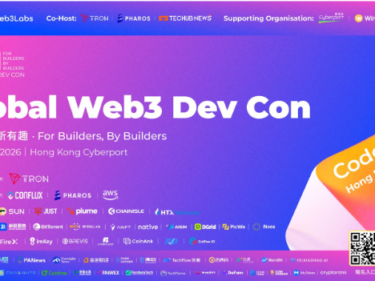Phuture AMA Recap

Phuture is a decentralised protocol built for the creation and investment of token based passive investment strategies in a Web3 environment.
Today we have Charles Storry as Head of Growth & Oliver Mehr as Head of Product of Phuture joining us to answer our questions for the next hour.
 Charles Storry, a Phuture Head of Growth.
Charles Storry, a Phuture Head of Growth.
From 2016-2017, has been a Partner at First Stirling Recruitment, a firm that helps financial services companies recruit professionals.
Previously, Head of Strategic Partnerships at SVK Crypto a Block.one backed venture firm.

Oliver Mehr, a Phuture Head of Product.
Investor into blockchain-enabled companies and decentralised protocols since 2016.
Previously, Partner at SVK Crypto a Block.one backed venture firm.
Question from the CryptoRank team
#1. Could you please tell us more about yourself and your experiences?
Charles Storry: – We are an experienced team with backgrounds ranging from traditional venture and programming.
Oliver and I have been in the crypto space since 2016 and have worked together for the past 5 years. Prior to Phuture, we were partners at a UK based Venture Firm backed by Block.One – we invested into early stage businesses looking to incorporate blockchain.
We have invested in an array of different industries from Adtech, to Gaming to VR. We co-invested alongside some great names, such as – Google Ventures and Alibaba to name a few.
It’s important to note, each of our investments wanted to incorporate blockchain which was our value add. From our hands-on experience a lot of the lessons we have learnt Phuture has benefited from. This will be clear in the user experience we have created.
#2. Can you tell us about Phuture? What problems do you solve, both in the space and for the community?
Charles Storry: – Phuture is a decentralised protocol built for the creation and investment of passive index strategies in a Web3 environment. Which encompasses the following:
1. Permissionless Index Creation
2. Smart, scalable Index Architecture
3. Deep liquidity at all times.
Oliver Mehr: – Creating a permissionless index creation architecture is a non trivial problem to solve. We have reengineered the index architecture to allow us to rebalance any number of indices, without increasing computational complexity.
We allow users to easily create index products that can use dynamic datasets, track top rankings of a sector, automatically reweight and rebalance at optimal times.
#3. Could you shortly describe the milestones Phuture have achieved, and about your upcoming plans?
Charles Storry: – Phuture has secured an IDO on Polkastarter on the 3rd of June.
Oliver Mehr: – https://twitter.com/Phuturedao/status/1396769043235938304
Phuture has brought onboard the head of product from Zerion as an adviser.
Which has been instrumental in designing an elegant, easy to use product that can be understood by non-crypto natives.
#4. What upcoming development are you most excited about?
Charles Storry: – Here is a breakdown of upcoming milestones:
Q2:
$PHTR token launch
Staking for $PHTR will be live
Testnet
Q3:
Snapshot voting
Expand yield optimisation strategies
Expand dynamic datasets
Q4:
Development of cross-chain indices
L2 deployment
Meta governance support
Questions from Telegram
#1. Do you have plans of burning and buyback of Your token? how do you want to maintain its price and supply uniformly?
Oliver Mehr: – Yes PHTR will be burnt when indices are redeemed. Also fees generated through AUM and Yield will be used to buy back PHTR tokens.
#2. What are the additional benefits of holding your tokens over those that don’t hold your tokens and is there also any benefits for long term holders?
Oliver Mehr: – PHTR holders who do not stake. Will be diluted over time, because PHTR will be given to users who stake, and therefore, their relative control over the platform will increase over time vs someone who doesn’t stake. In the long run, PHTR will be required to unlock certain platform features. In the short term, we want to make it accessbile for anyone and grow.
#3. What are the features that makes you better than other platform? What are the benefits/advantages you provide to both users and project that no one can?
Oliver Mehr: – “Phuture has designed its platform in a unqiue way to our competitors. I define these comps as Index Coop, Powerpool, PieDAO and Indexed. The latter three are all based on balancer smart pools. One thing that those projects have realised is balancer smart pools are in flexible due to being an AMM.
Here are some examples: When you create new balancer smart pool it doesnt have any liquidity, so users cant do one sided deposits because slippage is too high. Therefore, users must bring every asset in the index in order to mint. This is a poor user experience, most people dont own all the assets of an index, that is the reason they are buying. Phuture solves this by tapping into external liquidity, this means that regardless of the size of your index, your execution costs will be roughly the same. Whereas on balancer the depth of the pool heavily dictates how much price impact you experience. This might be fine if you only have a few indices which are all quite deep but on Phuture we are letting anyone create indices which means we will have indices that are not that popular. Regardless, if someone wants to invest in a less popular index it should be the same experience.
The other problem that smart pools have are related to optimisation. In order to push assets to yield optimisers you must remove assets from the AMM, this negatively affects the price impact when minting. If you smart pool is only small you cannot afford to push any assets to yield optimisers. Therefore, these smaller indices dont get additional yield. On Phuture, we aggregate all indices into pools of the same asset. Then we push assets from that pool to yield optimisers. The yield that we get is then shared across all indices that hold that asset proportional tol their size. This means even small indices benefit from yield optimisation.
Obviously, when compared to Index coop, they dont let you create your own index without governance permission. Phuture does. Also their rebalancing auction requires quite a lot of coordination, so they only rebalance monthly/quarterly. If you rebalance quarterly your index assets will be far out of balance, especially because crypto moves so much. Also auction arent robust in network congestion and index investors end up giving too much value away to keepers. Lastly, set rebalances each index individually, whereas Phuture rebalances many indices at the same time. This means the cost to rebalance on Phuture is spread over many indices, reducing the individual cost. Phuture can rebalaance more frequently than once a quarter or once a month if it needs to.
Phuture doesnt rebalance all the time like a balancer smart pool, it only rebalances when our engine decides it is a good time to do that. We use bollinger bands to help us make this decision. By rebalancing at better times we can significantly improve index returns as well.”
#4. How can users stay updated with this project? Are there channels, including local communities where users can get the latest updates?
Charles Storry: – Socials:
Information:
#5. What are the 2 or 3 fundamental pillars of your token that will guarantee its success?
Oliver Mehr: – Reduction of supply through burning when indices are redeemed. Fees are used to buy back and distribute the PHTR token.



